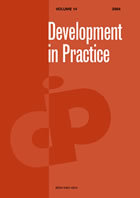
Instituto de Estudios sobre Desarrollo y Cooperación Internacional
Nazioarteko Lankidetza eta Garapenari Buruzko Ikasketa Institutua

Instituto de Estudios sobre Desarrollo y Cooperación Internacional
Nazioarteko Lankidetza eta Garapenari Buruzko Ikasketa Institutua
Instituto de Estudios sobre Desarrollo y Cooperación Internacional
Nazioarteko Lankidetza eta Garapenari Buruzko Ikasketa Institutua
CONTENIDOS
SECCIÓN GENERAL
Le Maroc actuel est saturé de références à la souveraineté économique, à l’instar de ce qu’a donné à voir la gestion du tremblement de terre de septembre 2023. Ce dossier, qui constitue le cœur de ce numéro double, a pour objectif de déconstruire cette notion ambivalente et plurielle. Il vise à mettre en évidence la diversité et la subtilité des enjeux politiques et économiques derrière les revendications toujours plus nombreuses de souveraineté. En abordant la souveraineté par ses modalités, le cas marocain permet de mettre en lumière les lieux d’exercice du pouvoir, les pratiques politiques ordinaires et les représentations de l’économie politique – autrement dit, les fondements économiques du pouvoir. Plus précisément, le dossier s’intéresse aux différentes manières par lesquelles la souveraineté économique est confortée ou revendiquée. Il rassemble des contributions sur les pouvoirs locaux, les trajectoires d’entreprises et d’entrepreneurs, la production et la vente de denrées alimentaires ou de cannabis, ou encore l’activité d’une commission nationale. Toutes éclairent l’importance, la diversité et la contingence des sources de souveraineté, ainsi que les conflits qu’elle suscite.
Le Dossier
Recherches
Conjoncture
Lectures
Articles
Resources Compiled by Anandita Ghosh, Mahima Nayar, and Shivani Satija.
Book Reviews
La democracia liberal no es la primera vez que vive una crisis profunda en la comunidad internacional. El término Democracia se utiliza en casi todos los regímenes, desde el franquista (democracia orgánica) a los de la órbita de la Antigua Unión Soviética (democracias populares), pasando por otros muchos, en todos los continentes, por lo que esta denominación no siempre tiene el mismo alcance y significado.
Este número de Ecología Política pone el foco en la pérdida de biodiversidad, abordando muchas de sus ramificaciones. «Crisis ecológica y pérdida de biodiversidad» analiza desde cómo incorporar a las comunidades indígenas y el mundo rural en la expansión de áreas protegidas, hasta la amenaza de la bioingeniería, pasando por la denuncia de los mecanismos de compensación y un sistema agroalimentario responsable de la mayoría de la pérdida de biodiversidad global.
OPINIÓN
EN PROFUNDIDAD
BREVES
REDES DE RESISTENCIA
REFERENTES AMBIENTALES
CRÍTICA DE LIBROS
EDITORIAL
REFLECTIONS
ARTICLES
EDITOR'S CHOICE
BOOK REVIEWS
CORRIGENDA
CONTENIDOS
Sección General
Hoy tenemos distopías para todos los gustos ideológicos, mientras el futuro parece cancelado como territorio de imaginación de un mundo mejor. En este contexto de «realismo capitalista», volver sobre la utopía –y sobre la posibilidad misma de imaginar futuros deseables– parece una condición para cualquier rearme ideológico progresista. Y a ello se dedica el Tema Central de este número de Nueva Sociedad.
Puedes consultar el índice y leer parte del contenido siguiendo este enlace.
CONTENIDOS
Sección General
Han pasado más de setenta años y el mundo de ayer, en expresión del célebre Zweig, parece sobrepasado por los nuevos vientos que soplan desde el sur global, los BRICS, China, Rusia y otros países ya emergidos, que reclaman tácita o expresamente, un nuevo rol en las relaciones internacionales y cambios en las instituciones mundiales. Afrontar desafíos como el cambio climático, la pandemia, los conflictos (como el de Gaza, o el de Ucrania), los derechos humanos, la economía etc..requieren de transformaciones institucionales y normativas.

|
Revista internacional editada por OXFAM Gran Bretaña y Routledge. Dedicada al análisis e investigaciones que se basan en la práctica en torno a la dimensión social del desarrollo y la ayuda humanitaria, y, además, brinda un foro mundial de debate e intercambio de ideas entre profesionales, académicas/os y políticos/as, incluyendo a activistas y ONGD. Al cuestionar las premisas reinantes, la revista busca fomentar ideas y prácticas nuevas. En Hegoa se pueden consultar los ejemplares publicados desde 1993. Disponibles resúmenes aquí. Última entrega
|
ARTÍCULOS
VIEWPOINTS
CONFERENCE REPORT
PART I: THEMES
PART II: COUNTRY STUDIES
Artículos sobre: Ethiopia, South Africa, Tanzania, Egypt, China, West Bengal, Indonesia, Philippines, Central Asia, USSR